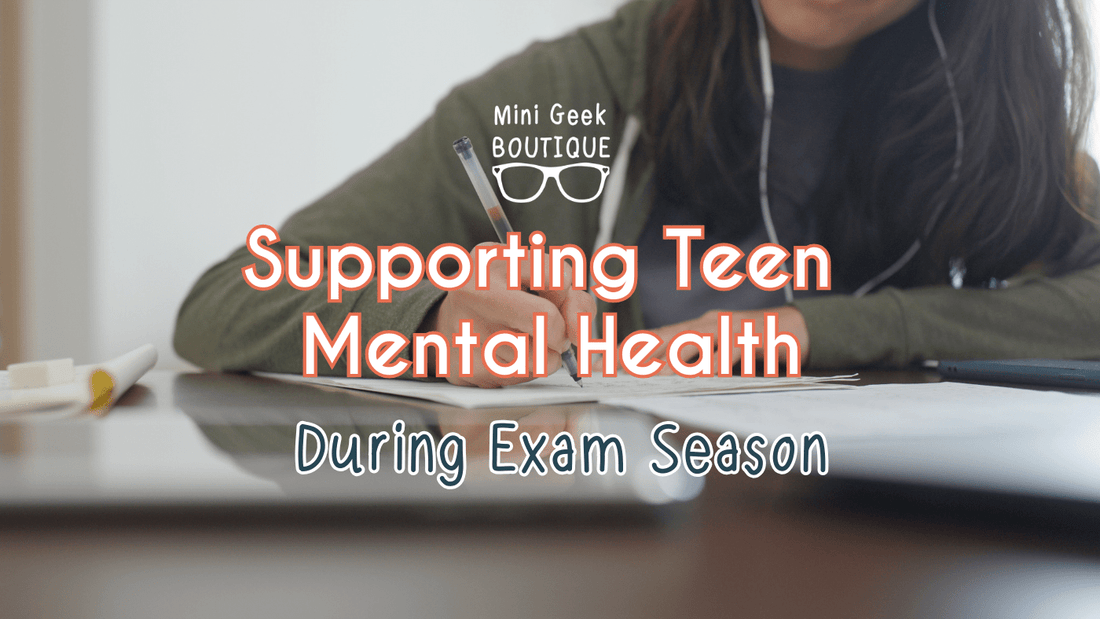
Supporting Teen Mental Health During Exam Season
Share
Exam season is fast approaching in the UK, bringing with it the stress and anxiety that often accompanies it. The pressure to achieve the highest grades possible can be incredibly overwhelming, especially when the expectations of teenagers come from so many different directions. Navigating these emotions during such a stressful time can feel like a huge challenge.
The impact of exams on teenagers can manifest in a variety of ways, but parents and carers can be more supportive than they might think.
With my experience as a teacher, working with teens preparing for exams, I’ve seen a vast range of emotions and challenges, from stress and anxiety to moments of resilience and growth.

What Stress Looks Like in Teens
Stress and anxiety can affect anyone in different ways, but the most common signs to watch out for in teenagers include:
- Feeling anxious or down
- Becoming irritable or angry
- Struggling to sleep
- Changes in eating habits
- Having negative thoughts about themselves (this can be hard to spot, but changes in behaviour may signal something is wrong)
- Worrying about the future
- Losing interest in things they normally enjoy
- Finding it hard to focus or concentrate
- Feeling physically unwell—like headaches, nausea, or fatigue (sometimes teens may not want to share these symptoms, or they may not recognise them themselves, so it's important to create an open and supportive space for discussion)
As a parent, you know your teen better than anyone. If you notice any unexplained changes in behaviour, try to have an open conversation about their concerns and anxieties.
Teenagers are already experiencing significant hormonal and emotional changes, and when exams are added into the mix, it can feel like an emotional rollercoaster for everyone involved.
Why Exams Feel So Overwhelming
Teenagers often face pressure from all sides, including from themselves. Exams represent an important step into adulthood, and many teenagers will place immense pressure on themselves to succeed. However, there’s also pressure from schools, especially in the UK, where schools are often focused on ensuring that every student passes their exams. The pressure to meet these expectations often gets passed down to the students.
There’s also a societal environment that suggests failure if students don’t achieve high grades, where even a low grade is seen as a failure rather than a part of the learning process. This mindset, often driven by Ofsted evaluations or league tables, creates a culture of focusing on high marks at the expense of acknowledging effort, growth, and the value of mistakes.
From my own experience, I’ve seen students lose sleep because they feel like they’ve failed before even stepping into the exam room. This pressure can stem from peers, social media, or self-imposed expectations.

Strategies for Managing Stress
Creating a Realistic Revision Plan
One of the best ways to manage exam stress is to break down revision into manageable chunks. Instead of cramming all at once, students should spread their study sessions over time. Help them create a revision timetable that allows enough time for each subject, while also leaving room for breaks and relaxation. Prioritise topics by difficulty, but allow flexibility for when things don’t go to plan. Tools like apps or printable planners can help students stay organised and feel more in control of their preparation.
Encouraging Breaks and Rest
Studying non-stop can lead to burnout, reducing focus and productivity. Encourage regular breaks; every 30-45 minutes of study should be followed by a short rest. A walk, stretching, or even stepping away from the study space for a few minutes can help refresh focus and energy levels.
Make sure breaks don’t become another source of stress. Students should understand that breaks are necessary for overall well-being and efficiency. After a good break, they’ll be better able to retain information and work more effectively.
The Importance of Sleep and Nutrition
Sleep and nutrition are crucial for both mental clarity and academic performance. It’s tempting to stay up late studying, but proper rest is essential for memory consolidation and mental health. Encourage your teen to aim for at least 8 hours of sleep per night, especially during the week leading up to exams.
A healthy, balanced diet supports focus and mood. Encourage eating brain-boosting foods like leafy greens, whole grains, and protein-rich snacks, while limiting caffeine and sugary foods that can cause energy crashes.
Mindfulness and Breathing Techniques
Mindfulness and breathing exercises are powerful tools for managing anxiety and stress. Simple techniques like deep belly breathing or the "4-7-8" method can help calm the body and mind. Just a few minutes of mindfulness meditation can reduce stress and help clear the mind. Apps like Headspace or Calm offer free sessions designed to combat exam-related stress.
Limiting Screen Time Before Bed
The blue light from screens can interfere with the body’s natural sleep cycle, so encourage students to turn off devices at least 30 minutes before bedtime. Instead, suggest relaxing activities like reading, journaling, or listening to calming music to help them wind down and improve sleep quality.
Talking About Worries
It’s essential that students feel they have a safe space to express their concerns. Encourage them to talk to someone they trust—whether it’s a family member, friend, or teacher. Sometimes writing down their worries in a journal can also help reduce anxiety. If a student is struggling with anxiety or feeling persistently overwhelmed, professional support such as counselling can make a significant difference.
How Parents and Carers Can Help
Offering Emotional Support Without Piling on Pressure
Teens often feel overwhelmed by the pressure to perform well. As a parent or carer, you can offer invaluable emotional support while avoiding adding more stress. Focus on encouragement, rather than solely on results. Remind your teen that it’s okay not to be perfect, and that mistakes are part of the learning process. Reassure them that their well-being is more important than any grade. As YoungMinds points out, exams don’t define their worth.
Instead of asking, "How’s the revision going?" try asking, "How are you feeling about everything?" This subtle shift makes your teen feel emotionally supported, rather than judged on their performance.
Creating a Calm Home Environment
The atmosphere at home can significantly impact how your teen manages stress. Create a peaceful, quiet environment where they can focus and relax. Limit distractions like loud noises and interruptions during study time. A clutter-free space can help your teen feel more in control of their surroundings. Encourage moments of calm, such as a short walk or some soft music, to reduce tension.
Remember to maintain a balance between study time and relaxation. Your teen should have opportunities to reset emotionally and mentally, preventing burnout.
Helping Them Stay Connected Socially
Although it may seem like revision should be the top priority, it’s essential for teens to maintain social connections. Encourage your teen to take breaks to spend time with friends, either in person or virtually. Social interactions provide emotional support, distraction, and laughter, helping to alleviate stress. Encourage them not to isolate themselves, as this can increase feelings of loneliness and stress.
Encouraging Open Communication
Open communication is crucial to ensuring your teen feels supported. Let them know they can come to you with any concerns or anxieties. Teens may not always express their feelings directly, so checking in regularly is important. Asking "How are you feeling today?" or "Do you want to talk about anything?" creates space for them to share what’s on their mind, without the fear of judgment.
Encourage your teen to express their worries, whether about school or life in general. Listen without rushing to offer solutions—sometimes, the best way to support them is simply by making them feel heard and understood.
Additionally, it’s essential for parents to maintain open communication with their teen’s school. Teachers and school staff are there to support students in every way they can, and being in touch with the school ensures that your teen receives the appropriate help. Parents can ask about the exam boards their teen’s school is using, any extra revision sessions available, and any challenges the student may be facing. Schools often offer additional resources, and knowing how to access them can reduce stress for both the student and their family.
By offering emotional support, creating a calm home environment, maintaining social connections, encouraging open communication, and staying in touch with the school, parents and carers can ease the burden of exam stress. The focus should always be on your teen’s well-being, reminding them that their health and happiness matter more than any grade. This compassionate approach will help them navigate exam season with a sense of support and confidence.
When to Get Extra Help
Signs Stress is Becoming Unmanageable
If you notice signs of overwhelming anxiety, such as difficulty sleeping, frequent headaches, or changes in eating habits, it could indicate that stress is becoming unmanageable. Emotional signs like irritability, withdrawal from social activities, or persistent worry about exams are also red flags. Physical symptoms like stomach-aches or panic attacks can be common signs of intense stress.
If your teen seems increasingly overwhelmed or expresses feelings of hopelessness or a lack of motivation, it may be time to seek additional support.

Where to Seek Support
Several avenues for support are available when stress becomes too much to handle. Speak to your GP if you notice concerning physical or emotional symptoms. They can offer advice or refer you to services like counselling or mental health support. Many schools also offer counselling services where students can speak to a trained professional. Additionally, charities like Mind and YoungMinds provide resources and helplines for young people struggling with exam stress and mental health issues.
Helpful Websites for Parents
-
YoungMinds: www.youngminds.org.uk
Offers advice on supporting young people with their mental health, including exam stress. -
Mind: www.mind.org.uk
Provides mental health information and support, including resources for managing stress and anxiety. -
The NHS: www.nhs.uk
Offers advice on dealing with mental health issues and seeking professional support.
By acknowledging the stresses of exam season and offering emotional support, parents can make a meaningful difference in helping their teens navigate this challenging time. With understanding, compassion, and the right tools, exam stress doesn’t have to take over their lives.
It’s common for teenagers to struggle with seeing the bigger picture, especially during exams, which occur at such a transformative time in their lives. The pressure to succeed can often overshadow the importance of maintaining good physical and mental health. The good news is, we've all been through it, and we’re in a unique position to offer guidance and support. By sharing our own experiences, we can help them see that success isn’t solely defined by exam results.
As a parent or carer, you know your teen better than anyone else. Keep the lines of communication open, have regular conversations with them, and stay connected with their school. It’s important for your teen to understand that exams are not the end-all-be-all of their future. As long as they put in their best effort, that’s all anyone could ask for.
Future Blog Posts to Look Out For:
Stay tuned for future posts where we will dive deeper into these strategies, including tips for effective revision, how to balance study with relaxation, and more ways to manage stress leading up to exams. Each blog will offer more in-depth advice tailored to specific exam pressures, helping you navigate the journey to success with less stress!




